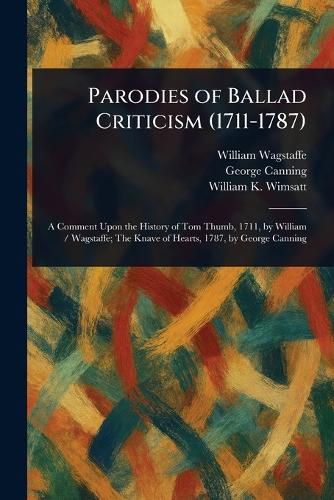Readings Newsletter
Become a Readings Member to make your shopping experience even easier.
Sign in or sign up for free!
You’re not far away from qualifying for FREE standard shipping within Australia
You’ve qualified for FREE standard shipping within Australia
The cart is loading…






This title is printed to order. This book may have been self-published. If so, we cannot guarantee the quality of the content. In the main most books will have gone through the editing process however some may not. We therefore suggest that you be aware of this before ordering this book. If in doubt check either the author or publisher’s details as we are unable to accept any returns unless they are faulty. Please contact us if you have any questions.
Explore the fascinating world of 18th-century ballad criticism through these satirical lenses. "Parodies of Ballad Criticism (1711-1787)" presents two enduring examples of wit and commentary: William Wagstaffe's "A Comment Upon the History of Tom Thumb" (1711) and George Canning's, writing as Gregory Griffin, "The Knave of Hearts" (1787).
This volume offers a glimpse into the literary landscape of England, where the popular ballad form was ripe for parody and intellectual engagement. Delve into the history and criticism surrounding English ballads, particularly as viewed through the humorous and insightful perspectives of Wagstaffe and Griffin. Their works provide a unique window into the era's literary tastes and the evolving understanding of popular verse. A treasure for scholars and enthusiasts of literary criticism and poetry, this meticulously prepared edition preserves these important historical texts.
This work has been selected by scholars as being culturally important, and is part of the knowledge base of civilization as we know it.
This work is in the public domain in the United States of America, and possibly other nations. Within the United States, you may freely copy and distribute this work, as no entity (individual or corporate) has a copyright on the body of the work.
Scholars believe, and we concur, that this work is important enough to be preserved, reproduced, and made generally available to the public. We appreciate your support of the preservation process, and thank you for being an important part of keeping this knowledge alive and relevant.
$9.00 standard shipping within Australia
FREE standard shipping within Australia for orders over $100.00
Express & International shipping calculated at checkout
This title is printed to order. This book may have been self-published. If so, we cannot guarantee the quality of the content. In the main most books will have gone through the editing process however some may not. We therefore suggest that you be aware of this before ordering this book. If in doubt check either the author or publisher’s details as we are unable to accept any returns unless they are faulty. Please contact us if you have any questions.
Explore the fascinating world of 18th-century ballad criticism through these satirical lenses. "Parodies of Ballad Criticism (1711-1787)" presents two enduring examples of wit and commentary: William Wagstaffe's "A Comment Upon the History of Tom Thumb" (1711) and George Canning's, writing as Gregory Griffin, "The Knave of Hearts" (1787).
This volume offers a glimpse into the literary landscape of England, where the popular ballad form was ripe for parody and intellectual engagement. Delve into the history and criticism surrounding English ballads, particularly as viewed through the humorous and insightful perspectives of Wagstaffe and Griffin. Their works provide a unique window into the era's literary tastes and the evolving understanding of popular verse. A treasure for scholars and enthusiasts of literary criticism and poetry, this meticulously prepared edition preserves these important historical texts.
This work has been selected by scholars as being culturally important, and is part of the knowledge base of civilization as we know it.
This work is in the public domain in the United States of America, and possibly other nations. Within the United States, you may freely copy and distribute this work, as no entity (individual or corporate) has a copyright on the body of the work.
Scholars believe, and we concur, that this work is important enough to be preserved, reproduced, and made generally available to the public. We appreciate your support of the preservation process, and thank you for being an important part of keeping this knowledge alive and relevant.